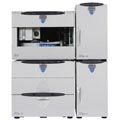Thermo Scientific IC Used in Butanol Biofuel Production
Biofuel production requires monitoring of feedstocks, fermentation processes, and finished products to assure yield and final quality of alternative fuels.

Biofuel production requires monitoring of feedstocks, fermentation processes, and finished products to assure yield and final quality of alternative fuels. The Thermo Scientific Dionex ICS-5000 ion chromatography (IC) system is ideal for measuring carbohydrate contents of feedstocks like corn stover, alcohol and glycol levels of fermentation solutions, and anionic contaminants such as chloride and sulfate in alcohols and biodiesel.
While ethanol has many benefits as an alternative to petroleum, it has higher vapor pressure, higher affinity for water, and lower energy content than gasoline. High blending ratios of ethanol with gasoline require modified engines, and the lower energy content reduces vehicle gas mileage. In addition, ethanol production places greater demand on the food and feed commodity markets.
Biobutanol overcomes many of these drawbacks. It can be created from cellulosic biomass as well as annual grain crops. It has lower vapor pressure, lower water solubility, and higher energy density than ethanol. It can be blended at any point in the supply chain, and increases vehicle gas mileage. Learn about Thermo Fisher Scientific’s biofuel solutions, and two simple IC methods to determine total and potential sulfate and total chloride in butanol, based on ASTM ethanol methods, at ref="http://www.thermoscientific.com/butanol">thermoscientific.com/butanol
The Complexity of Oligonucleotide Separations
January 9th 2025Peter Pellegrinelli, Applications Specialist at Advanced Materials Technology (AMT) explains the complexity of oligonucleotide separations due to the unique chemical properties of these molecules. Issues such as varying length, sequence complexity, and hydrophilic-hydrophobic characteristics make efficient separations difficult. Separation scientists are addressing these challenges by modifying mobile phase compositions, using varying ion-pairing reagents, and exploring alternative separation modes like HILIC and ion-exchange chromatography. Due to these complexities, AMT has introduced the HALO® OLIGO column, which offers high-resolution, fast separations through its innovative Fused-Core® technology and high pH stability. Alongside explaining the new column, Peter looks to the future of these separations and what is next to come.
Metabolomics Analysis of Low Birth-Weight Infants Using UHPLC-MS/MS Following Lipid Emulsion
January 10th 2025A recent study aimed to directly compare the changes in serum metabolites among very low birth-rate (VLBW) infants following the administration of the soybean oil-based lipid emulsion and soybean oil, medium-chain triglycerides, olive oil, and fish oil (SMOF) lipid emulsion using untargeted metabolomics techniques.
Analyzing New Drug Modalities: An ISC 2024 Interview with Kelly Zhang
January 10th 2025At ISC 2024 in Liverpool, United Kingdom, LCGC International interviewed Kelly Zhang of Genentech about her work analyzing new drug modalities, such as mRNA, oligonucleotides, peptides, and cell and gene therapies.